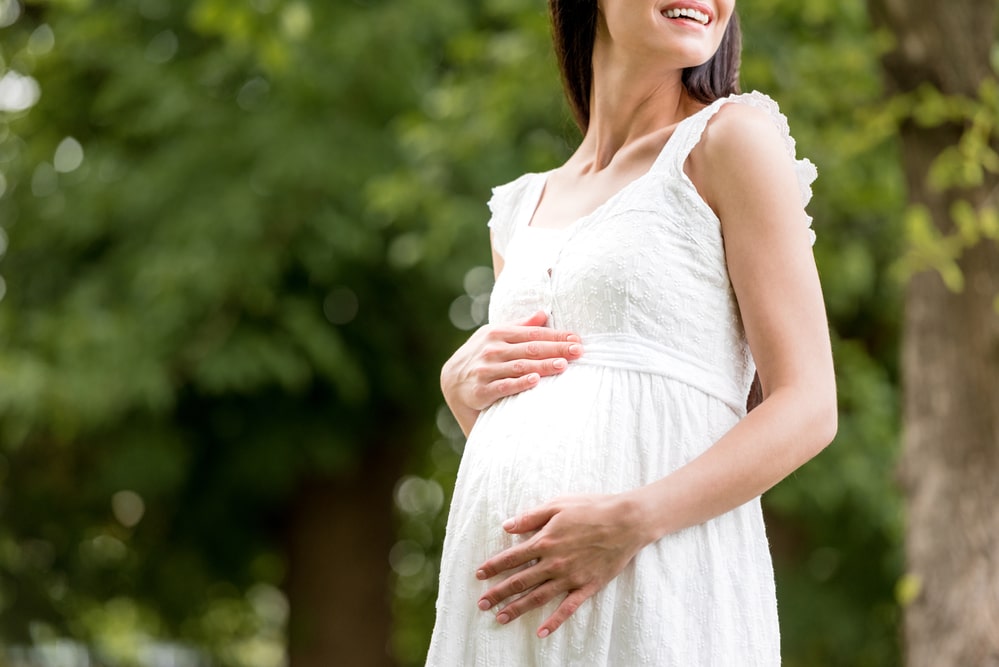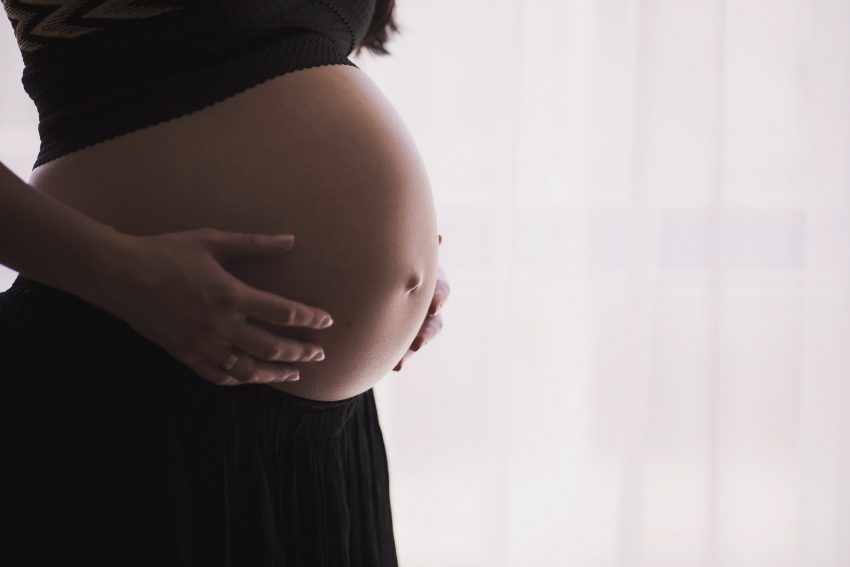Just as every baby is unique, every pregnancy bump is different too. A woman’s body goes through many changes during pregnancy and her baby bump will continue to change right up until the day she gives birth.
It is often assumed that heavily pregnant women have a hard round stomach and while this is true for many moms, it is not the case for every pregnant woman. If your stomach is soft during late pregnancy, do not feel alarmed.
Just because your sister had a rock-hard baby bump all throughout her third trimester, doesn’t mean you need to worry because you have a soft stomach during late pregnancy.
If your soft baby bump has left you feeling confused, keep reading this article as we explain why some women have a soft stomach during late pregnancy.
If you are have been worrying that your baby bump should be hard right until the end of your pregnancy, keep reading for reassurance and to put your mind at rest.
Should Your Stomach Be Hard Or Soft When Pregnant?
All bodies are different and no pregnancy bumps are the same. All women carry their growing babies in different ways. There are the women who start showing at the start of the second trimester, are ‘all bump’, and do not put an ounce of weight on anywhere else.
Then there are the women who can go right up to the day they give birth only looking like they have put on a little bit of weight, no ballooning baby bump in sight.
Some women carry their bumps high, others low and some moms-to-be put weight on all over during their pregnancy. No pregnant body is the right kind of pregnant body. All pregnant women are beautiful and all baby bumps are special.
However, some expectant moms may feel confused about the firmness of their stomachs during their pregnancy. Should your stomach be hard or soft when pregnant?
It is important to remember that a woman’s body will change throughout her pregnancy and sometimes her bump will be hard and other times it will be soft.
It is not the norm for a woman’s stomach to remain the same firmness throughout her entire pregnancy.
There are various factors that will determine the firmness of your baby bump:
View in gallery
The trimester you are in
During the first trimester, pregnant women experience several pregnancy symptoms. In the first 12 weeks of pregnancy expectant moms may suffer from exhaustion, morning sickness, constipation, bloating, tender breasts, and food aversions – to name just a few!
In the first trimester, pregnant women often don’t yet look pregnant, their stomachs will continue to look the same as before they were pregnant in these early weeks.
However, some women experience bloating during the first trimester, this can make their stomach look larger and feel firmer than usual.
A ‘bump’ during the first trimester is often just bloating and gas, not your growing uterus and baby. This swelling and bloating is a result of the pregnancy hormone progesterone.
In the second trimester, the uterus and baby continue to grow and this is often when a woman’s baby bump will ‘pop’. As the second trimester progresses women begin to look pregnant and it becomes more difficult to hide their bumps.
In this trimester your stomach can be soft or hard but for many women, as their uterus grows up out of their pelvis, their abdominal area becomes firmer.
The second trimester is often described as the best trimester during pregnancy as morning sickness has usually eased but the baby bump is not too big to be uncomfortable yet either.
During the third and final trimester, a pregnant woman’s stomach can be soft or hard. As the baby grows the uterus stretches making the stomach bigger but the firmness of the stomach will vary from woman to woman.
If you are nearing labor, your baby may have ‘dropped’ into your pelvis, making the top of your stomach feel softer. If your baby is positioned far forward in your uterus your bump may feel firmer.
By the end of the third trimester, the uterus will be the size of a watermelon and for lots of women, this makes their stomach feel tight and hard. The third trimester is often the most uncomfortable for moms-to-be as their baby bump is now extremely cumbersome and heavy.
Your pre-pregnancy body type
View in gallery
Our bodies are all different and every woman will have a unique baby bump and pregnant body. The firmness of your stomach during pregnancy can be affected by your weight and body shape.
Athletic women with strong abdominal muscles may take longer to show and their bump will feel firm as their uterus grows. Slimmer women may also show sooner and have a harder stomach.
Women who have a larger stomach pre-pregnancy may continue to have a soft feel to their stomach right into later pregnancy. This is because their uterus has more room to grow and stretch before it ‘pops’. If there are more layers of fat then the pregnant belly will feel softer.
The position of your baby and uterus
Some women have a uterus that is positioned further back in their body than others. If your uterus is further back then your baby can grow in there for longer before your stomach begins to stretch and harden.
If you are carrying your baby further forward in your body your bump may pop out sooner and your stomach will feel hard.
The position of your baby
Your baby is moving around in your womb right from the early stages of pregnancy. However, most women don’t start to notice these movements until they are in their second trimester.
The position of your baby in the womb will impact how soft or hard your stomach feels. If your baby is lying in a certain position some parts of your abdomen may feel soft and others firm and tight.
As your baby grows you may even be able to notice certain parts of their body, like their hands and feet, as they stretch and move.
You are experiencing Braxton Hicks
As you progress through the second trimester and into the third trimester you will begin experiencing Braxton Hicks contractions.
These are often referred to as ‘practice contractions’ and they occur when the uterus tightens irregularly, as it prepares for labor. Braxton Hicks can feel like menstrual cramps but can also be completely painless for some women.
View in gallery
If you notice that your stomach goes tight suddenly and goes soft again a couple of minutes later, you are likely just experiencing Braxton Hicks. These practice contractions can sometimes be mistaken for early labor.
However, unlike true labor contractions, Braxton Hicks do not increase in intensity and frequency, they often pass quickly and have no regular pattern.
You are in labor
When you go into labor you will be having frequent and regular contractions. Contractions are your uterus tightening, encouraging your cervix to open in preparation for you to push your baby out.
True labor contractions will make your stomach feel tight and firm and will grow in intensity becoming more painful and regular over time, unlike Braxton Hicks.
Related Article: Can A Baby Break Your Ribs While Pregnant?
Does Your Belly Get Softer Before Labor?
As you can see, there are many factors that will influence the firmness of your stomach during pregnancy. But does your belly get softer before you go into labor?
During late pregnancy, your baby will move lower down your body into your pelvis as they are getting ready for birth. When your baby ‘drops’ into your pelvis this is called lightening.
This process is referred to as such as it relieves the pressure on mom’s organs and frees up some space in the top of her abdomen. As the baby moves down into the pelvis the top of the stomach may feel soft and you should find it easier to breathe (although pelvic and back pain may increase).
If your stomach feels soft during late pregnancy, it may simply be because your baby has moved down into your pelvis. The lower your baby has moved down in your body, the softer the top half of your abdomen is likely to feel.
Why Is My Pregnant Belly Sometimes Hard And Sometimes Soft?
View in gallery
The firmness of your baby bump will change throughout your pregnancy and there are lots of reasons why it may feel soft or hard at different times.
You may think your baby bump should stay firm throughout your whole pregnancy but this is not the case. Gas, bloating, Braxton Hicks, and weight gain can all impact the firmness of your stomach during pregnancy.
Your baby bump can change throughout the day and your baby’s movements will also play a part in whether your belly is soft or hard during the second and third trimester. There is no reason to be alarmed if your stomach is soft at times during any stage of your pregnancy.
FAQs
Does your stomach get really hard before labor?
In the third trimester, stomach tightening may be a sign of labor. Labor contractions usually start out very mild and then gradually build in intensity.
Can contractions start at the top of your stomach?
True labor contractions typically start at the top of the uterus, causing an intense tightening sensation that becomes progressively more painful as your labor progresses.
Why is my pregnant belly not getting hard?
The belly that stays momentarily hard after 20 weeks of gestation represents training contractions called Braxton Hicks.
The Final Thought
If you are wondering whether your stomach should be soft during late pregnancy, we hope this article has helped to clear things up. During the later stages of pregnancy, your baby will ‘drop’ into your pelvis and this can leave you with a softer stomach than you had earlier on in your pregnancy journey.
As always, if you are concerned about anything during your pregnancy it is best to speak to your OBGYN for professional advice and reassurance. Pregnant bodies are all unique and as long as you and your baby are healthy, you do not need to worry about having a softer stomach during late pregnancy.
If you need to know about pregnancy, check out our guide here.






